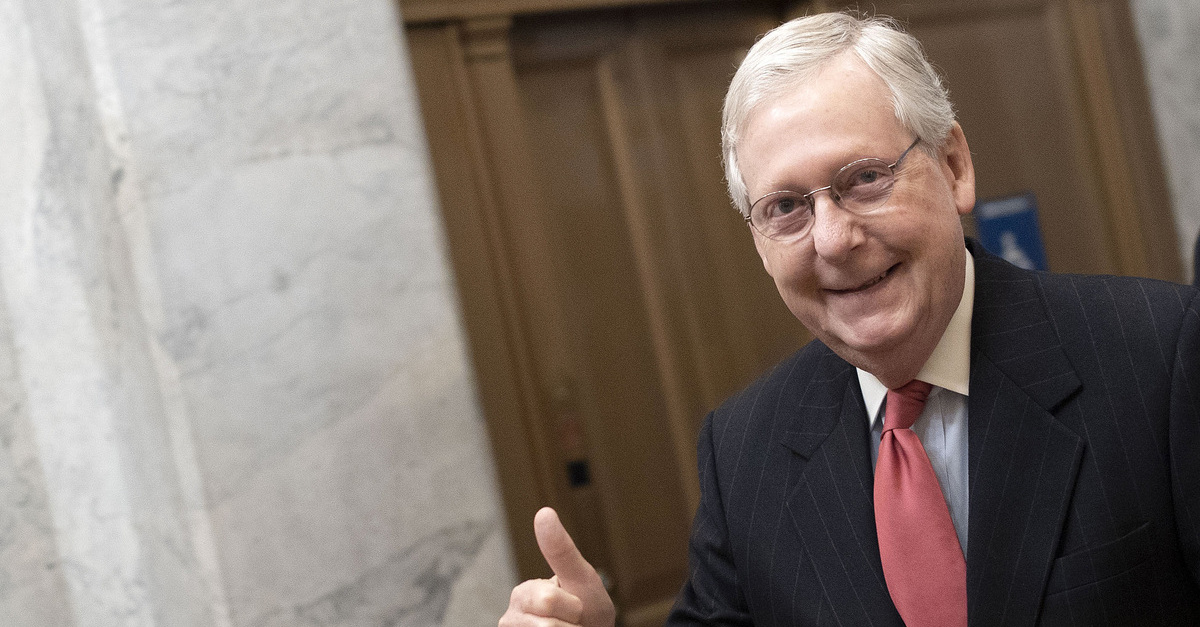
The U.S. Senate’s proposed $2 trillion novel Coronavirus (COVID-19) pandemic relief package contains a number of controversial provisions–including what’s widely been described as a $500 billion slush fund for preferred corporations–with little to no oversight.
An additional section of the massive, 890-page rescue bill adds a further layer of potential inscrutability when it comes to the release of those corporate slush funds. The provision in question has also resulted in several dozen additional decibels of outrage.
Titled “Temporary Government In The Sunshine Act Relief,” the provision authorizes the Federal Reserve Board and other such officials to meet in secret without any oversight constraints. Law&Crime obtained a copy of the “close-to-final” version of the Senate’s proposed legislation–containing the language in question.
The pro-secrecy provision reads, in relevant part:
SEC. 4009. TEMPORARY GOVERNMENT IN THE SUNSHINE ACT RELIEF.
(a) IN GENERAL.—Except as provided in subsection (b), notwithstanding any other provision of law, if the
Chairman of the Board of Governors of the Federal Reserve System determines, in writing, that unusual and exigent circumstances exist, the Board may conduct meetings without regard to the requirements of section 552b of title 5, United States Code, during the period beginning on the date of enactment of this Act and ending on the earlier of—
(1) the date on which the national emergency concerning the novel coronavirus disease (COVID–19) outbreak declared by the President on March 13, 2020 under the National Emergencies Act (50 U.S.C. 1601 et seq.) terminates; or
(2) December 31, 2020.
The secrecy measures are therefore set to terminate either when President Donald Trump‘s Coronavirus national emergency declaration is revoked or on the last day of the present year. This limited-time secrecy would be achieved by giving the Federal Reserve a reprieve from one of the nation’s foremost Freedom of Information Act (FOIA) amendments.
The Government in Sunshine Act was passed in 1976 as part of a wave of pro-transparency measures by the Congress scandalized by Watergate and the generally anti-transparency tack pursued by the preceding administration of Richard M. Nixon.
In basic form, the act requires that all multi-member government agencies hold meetings that are open to the public–along with myriad record-keeping requirements imposed on those agencies and meetings.
A D.C. Court of Appeals decision from 2000 summed up the law:
The Sunshine Act provides, with ten specified exemptions, that “every portion of every meeting of an agency shall be open to public observation.” It imposes procedural requirements to ensure, inter alia, that advance notice is given to the public before agency meetings take place. It also imposes procedural requirements an agency must follow before determining that one of the ten exemptions from the openness requirement applies. However, neither the openness requirement, nor the related procedural requirements, are triggered unless the governmental entity at issue is an “agency,” and unless the gathering in question is a “meeting” of the agency.
Hammered out in secret over the past several days, the Senate’s proposed final relief legislation would do all-but do away with the longstanding transparency regime in favor of Federal Reserve secrecy.
And this provision–controversial in and of itself for eviscerating the time-honored transparency law on which all 50 states’s own open government laws are modeled–stands to be doubly controversial for its relationship to the Senate’s corporate bail out.
David Sirota, a senior adviser and speechwriter for Sen. Bernie Sanders (I-Vt.), noted:
Some context: The emergency legislation would empower Federal Reserve officials to direct hundreds of billions of dollars to corporations — and the same legislation would also allow those Federal Reserve officials to avoid longstanding sunshine/transparency laws.
The Senate is currently engaged in eleventh hour discussions about the bill after Sanders threatened a hold in response to a trio of GOP senators’ last-minute objections about provisions that would provide increased unemployment benefits.
[image via Win McNamee/Getty Images]
Have a tip we should know? [email protected]